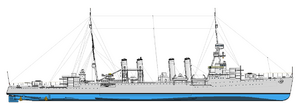Cagoa-Class Cruiser
This article is incomplete because it is pending further input from participants, or it is a work-in-progress by one author. Please comment on this article's talk page to share your input, comments and questions. Note: To contribute to this article, you may need to seek help from the author(s) of this page. |

| |
| Class overview | |
|---|---|
| Name: | Cagoa-class cruiser |
| Builders: | Royal Shipbuilders of Cacerta |
| Operators: |
|
| Succeeded by: |
|
| In commission: | 1910 – 1942 |
| Planned: | 8 |
| Completed: | 8 |
| Lost: | 2 |
| Retired: | 6 |
| General characteristics | |
| Type: | Cruiser |
| Displacement: |
|
| Length: | 170 meters |
| Beam: | 16.9 meters |
| Draft: | 6.1 meters |
| Propulsion: |
|
| Speed: | 35 knots (65 km/h) |
| Range: | 9,000 nautical miles at 10 knots |
| Complement: | 458 officers and crew |
| Sensors and processing systems: | Type 121 ASDIC |
| Armament: |
|
The Cagoa-class was class of fleet cruiser built for the Cacertian Royal Navy in the early 1900s. It was the first family of traditional cruiser to be ordered for Cacerta after the Royal Navy decided to abandon armored cruisers in favor of dreadnought battleships. Despite the overwhelming adoption of the Decisive Battle Doctrine, several admirals of the navy felt that it was necessary to continue to explore and invest in other capital ship types.
Admiral Asterio Marini, who was primarily responsible for the RN’s procurement program, ordered the development of a cruiser without the explicit orders of the Grand Admiral. He presented the design of the Cagoa-class to Cianna Davion in 1906 and managed to convince her that the current destroyers in the Cacertian fleet, while capable, did not have the same kind of range or detection capability that a fast fleet cruiser could. The first Cagoa-class cruiser was ordered in 1908.
By comparison to the previous armored cruisers, the Cagoa-class was nearly twenty meters longer and over ten knots faster. They were not nearly as well armed or armored, but they did possess a longer-range radio telegraph that was meant to allow it to perform reconnaissance for much larger Cacertian fleet elements.
A total of eight ships were completed, six of which would serve with the Grand Fleet during the Divide War in which two were lost due to combat. After the conflict, the remianing ships underwent a refit program and would later serve as fleet and convoy escorts during the Siduri War.
Design
Armament
Armor
Propulsion
Construction
Service History
Current Status
Units
| # | Designation | Name | Shipyard | Laid down | Launched | Commissioned | Status | Commanding Officer |
|---|---|---|---|---|---|---|---|---|
| I | C-Ca-001 | Cagoa | N/A | |||||
| II | C-Ca-002 | Rotina | ||||||
| III | C-Ca-003 | Taviche | ||||||
| IV | C-Ca-004 | Alesello | ||||||
| V | C-Ca-005 | Palessari | ||||||
| VI | C-Ca-006 | Talamis | ||||||
| VII | C-Ca-007 | Cartada | ||||||
| VIII | C-Ca-008 | Nasina |